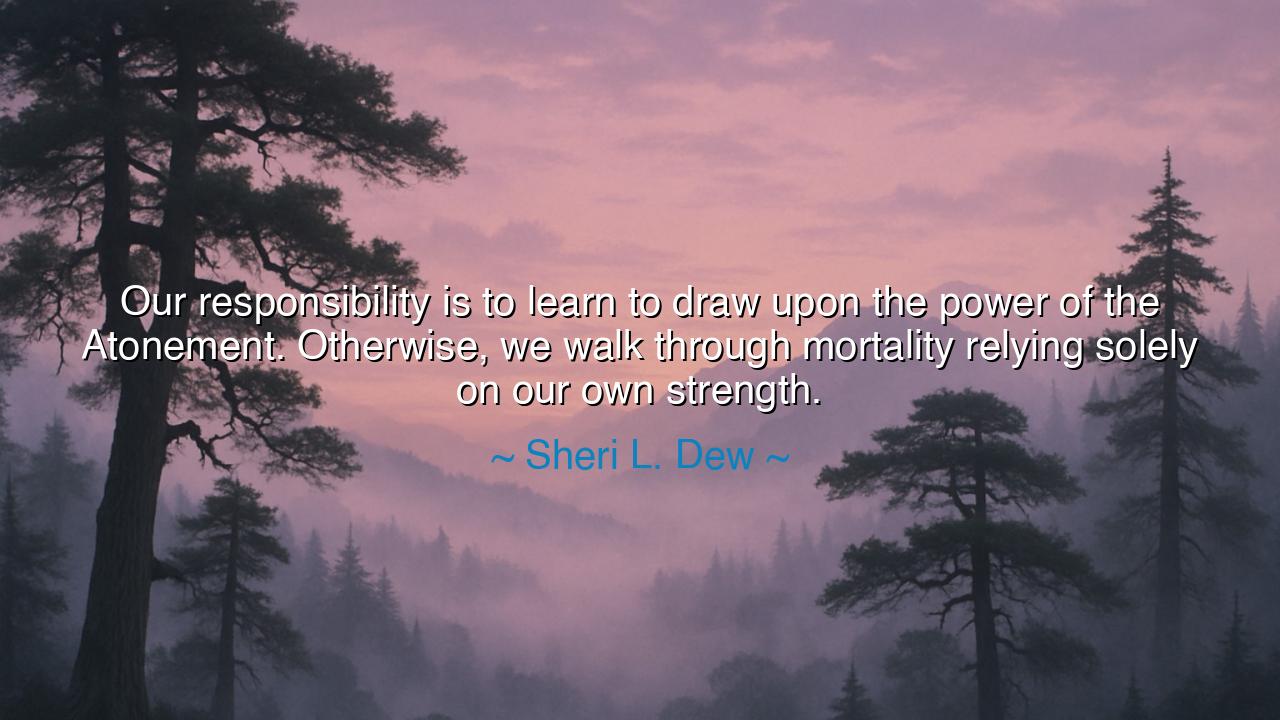
Our responsibility is to learn to draw upon the power of the
Our responsibility is to learn to draw upon the power of the Atonement. Otherwise, we walk through mortality relying solely on our own strength.






Hear the words of Sheri L. Dew, a woman of faith and courage, who spoke thus: “Our responsibility is to learn to draw upon the power of the Atonement. Otherwise, we walk through mortality relying solely on our own strength.” In these words lies a truth that transcends the passing of centuries—that man, left to his own frailty, falters; but man who leans upon divine grace finds the strength to endure all things. For the journey of mortality is long and heavy, and the weight of sorrow, sin, and weakness is too great to bear unaided. Yet the Atonement, the sacrifice of Christ, offers an inexhaustible well of power, healing, and renewal.
The origin of this teaching lies in the Christian tradition, where the suffering of Christ in Gethsemane and His death upon the cross are held as the fountain of redemption. Sheri L. Dew, a modern voice within this tradition, reminds us that the Atonement is not merely a doctrine to be admired but a power to be drawn upon. It is not passive, but active; not distant, but present. To neglect it is to stumble through life alone; to embrace it is to walk with strength greater than our own, strength that is eternal.
History gives us shining mirrors of this truth. Consider the life of Corrie ten Boom, who, with her family, sheltered Jews during the terror of the Holocaust. Arrested and imprisoned, she watched her sister die in the camps, yet she emerged with a spirit unbroken. She testified that it was not her own strength that sustained her, but the power of Christ’s sacrifice, which gave her the ability even to forgive her captors. In her, we see Dew’s words come alive: left to her own strength, she would have collapsed. By drawing upon the power of the Atonement, she became radiant with courage and compassion.
The heart of Dew’s message is that mortality is not meant to be endured alone. Our flaws, our sorrows, our weaknesses—they are too heavy for solitary shoulders. Yet pride tempts us to try. We strive, we stumble, we despair, thinking our strength will suffice. But the wise understand that reliance on divine grace is not weakness; it is wisdom. Just as a branch cannot live apart from the tree, so we cannot endure without drawing from the living source of Christ’s love. To rely on Him is not surrender of effort, but the transformation of effort into something eternal.
There is here a paradox that humbles and inspires: we are strongest when we admit we are weak. For only then do we turn to the higher power that fills our emptiness. When we lean upon the Atonement, despair becomes hope, guilt becomes forgiveness, weakness becomes strength. The battles we could never win alone become victories, not because we are mighty, but because we are upheld by One who is mightier than death itself.
Consider also the story of Alma the Younger from the Book of Mormon, who, burdened with the torment of his sins, found no strength within himself. In his anguish, he cried out to Christ, and in that moment, the crushing weight was lifted, and peace filled his soul. His life was transformed into one of service and light. Such is the lesson: when we draw upon divine power, we discover a strength that is not our own, but infinitely greater.
The lesson for us is plain: do not try to walk through mortality with your own strength alone. Daily seek to draw upon the power of the Atonement. In prayer, lay down your burdens. In repentance, allow grace to cleanse you. In trial, call upon the One who has borne all sorrows. In weakness, trust that He will make you strong. The responsibility is ours—not to create the power, for it is already given, but to reach for it, to use it, to let it flow through us.
Thus, O seeker, remember Sheri L. Dew’s wisdom: our strength alone will fail, but His strength endures forever. Draw upon it, and you will find yourself upheld in trial, renewed in weakness, and transformed in spirit. This is not only the path of the faithful—it is the path of the wise. For to lean upon the Atonement is not to relinquish effort, but to sanctify it, to make mortal strength eternal, and to walk through life never alone.






AAdministratorAdministrator
Welcome, honored guests. Please leave a comment, we will respond soon